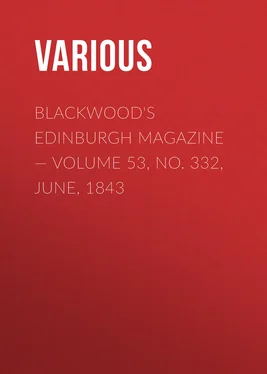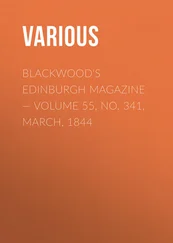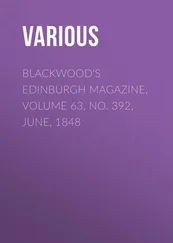Various - Blackwoods Edinburgh Magazine – Volume 53, No. 332, June, 1843
Здесь есть возможность читать онлайн «Various - Blackwoods Edinburgh Magazine – Volume 53, No. 332, June, 1843» — ознакомительный отрывок электронной книги совершенно бесплатно, а после прочтения отрывка купить полную версию. В некоторых случаях можно слушать аудио, скачать через торрент в формате fb2 и присутствует краткое содержание. Жанр: foreign_antique, periodic, foreign_edu, на английском языке. Описание произведения, (предисловие) а так же отзывы посетителей доступны на портале библиотеки ЛибКат.
- Название:Blackwoods Edinburgh Magazine – Volume 53, No. 332, June, 1843
- Автор:
- Жанр:
- Год:неизвестен
- ISBN:нет данных
- Рейтинг книги:4 / 5. Голосов: 1
-
Избранное:Добавить в избранное
- Отзывы:
-
Ваша оценка:
- 80
- 1
- 2
- 3
- 4
- 5
Blackwoods Edinburgh Magazine – Volume 53, No. 332, June, 1843: краткое содержание, описание и аннотация
Предлагаем к чтению аннотацию, описание, краткое содержание или предисловие (зависит от того, что написал сам автор книги «Blackwoods Edinburgh Magazine – Volume 53, No. 332, June, 1843»). Если вы не нашли необходимую информацию о книге — напишите в комментариях, мы постараемся отыскать её.
Blackwoods Edinburgh Magazine – Volume 53, No. 332, June, 1843 — читать онлайн ознакомительный отрывок
Ниже представлен текст книги, разбитый по страницам. Система сохранения места последней прочитанной страницы, позволяет с удобством читать онлайн бесплатно книгу «Blackwoods Edinburgh Magazine – Volume 53, No. 332, June, 1843», без необходимости каждый раз заново искать на чём Вы остановились. Поставьте закладку, и сможете в любой момент перейти на страницу, на которой закончили чтение.
Интервал:
Закладка:
But as I stood on the hill, gazing round to enjoy every shape and shade at leisure, my eye turned on the Castle. It spoiled all my serenity at once. I felt that it was a spot from which I was excluded by nature; that it belonged to others so wholly, that scarcely by any conceivable chance could it ever be mine; and that I could remain within its walls no longer, but with a sense of uselessness and shame.
If I could have taken staff in hand and pack on shoulder, I would have started at that moment on a pilgrimage that might have circled the globe. But the most fiery resolution must submit to circumstances. One night more, at least, I must sleep under the paternal roof, and I was hastening home, brooding over bitter thoughts, when I suddenly rushed against some one whom I nearly overthrew.—"Bless me, Mr Marston, is it you?"—told me that I had run down my old tutor, Mr Vincent, the parson of the parish. He had been returning from visiting some of his flock, and in the exercise of the vocation which he had just been fulfilling, he saw that something went ill with me, and taking my arm, forced me to go home with him, for such comfort as he could give.
Parsons, above all men, are the better for wives and families; for, without them, they are wonderfully apt to grow saturnine or stupid. Of course there are exceptions. Vincent had a wife not much younger than himself, to whom he always spoke with the courtiership of a preux chevalier . A portrait of her in her bridal dress, showed that she had been a pretty brunette in her youth; and her husband still evidently gave her credit for all that she had been. They had, as is generally the fate of the clergy, a superfluity of daughters, four or five I think, creatures as thoughtless and innocent as their own poultry, or their own pet-sheep. But all round their little vicarage was so pure, so quiet, and so neat—there was such an aspect of order and even of elegance, however inexpensive, that its contrast with the glaring and restless tumult of the "great house" was irresistible. I never had so full a practical understanding of the world's "pomps and vanities," as while looking at the trimmings and trelisses of the parson's dwelling.
I acknowledge myself a worldling, but I suppose that all is not lead or iron within me, from my sense of scenes like this. In my wildest hour, the sight of fields and gardens has been a kind of febrifuge to me—has conveyed a feeling of tranquillity to my mind; as if it drank the silence and the freshness, as the flowers drink the dew. I have often thus experienced a sudden soothing, which checked the hot current of my follies or frenzies, and made me think that there were better things than the baubles of cabinets. But it did not last long.
I mention this evening, because it decided my future life; or at least the boldest, and perhaps the best portion of it. We had an hour or two of the little variations of placid amusement which belong to all parsonages in romances, but which here were reality; easy conversation on the events of the county; a little political talking with the vicar; a few details of persons and fashions at the castle, to which the ladies listened as Desdemona might have listened to Othello's history—for the Castle was so seldom visited by them, that it had almost the air of a Castle of Otranto, and they evidently thought that its frowning towers and gilded halls belonged to another race, if not to another region of existence; we had, too, some of the last new songs, (at least half a century old, but which were not the less touching,) and a duet of Geminiani, performed by the two elder proficients on a spinet which might have been among the "chamber music" of the Virgin Queen; all slight matters to speak of, and yet which contributed to the quietude of a mind longing for rest—sights of innocence and sounds of peace, which, like the poet's music—
"Might take the prison'd soul
And wrap it in Elysium."
The moon shining in through panes covered with honeysuckle and fragrance of all kinds, at length warned me that I was intruding on a household primitive in their hours, as in every thing else, and I rose to take my leave. But I could not be altogether parted with yet. It seems that they had found me a most amusing guest; while, to my own conception, I had been singularly spiritless; but the little anecdotes which were trite to me had been novelties to them. Fashion has a charm even for philosophers; and the freaks and follies of the high-toned sons and daughters of fashion—who wore down my gentle mother's frame, drained my showy father's rental, and made even myself loathe the sight of loaded barouches coming to discharge their cargoes of beaux and belles on us for weeks together—were nectar and ambrosia to my sportive and rosy-cheeked audience. The five girls put on their bonnets, and looking like a group of Titania and her nymphs, as they bounded along in the moonlight, escorted us to the boundary of the vicar's territory.
We were about to separate, with all the pretty formalities of village leave-taking; when their father, in the act of shaking hands with me, fixed his eye on mine, and insisted on seeing me home. Whether the thought occurred to him that I had still something on my mind, which was not to be trusted within sight of a brook that formed the boundary to the Castle grounds, I know not, but I complied; the girls were sent homewards, and I heard their gay voices mingling, at a distance, and not unsuitably, with the songs of the nightingale.
I took his arm, and we walked on for a while in silence. At length, slackening his pace, and speaking in a tone whose earnestness struck me, "Charles," said he, "has any thing peculiarly painful lately happened to you?—if so, speak out. I know your nature to be above disguise; and with whom can you repose your vexations, if such there be, more safely than with your old tutor?"
I was taken unawares; and not having yet formed a distinct conception of my own grievances, promptly denied that I had any.
"It may be so," said my friend; "and yet once or twice this evening I saw your cheek alternately flush and grow pale, with a suddenness that alarmed me for your health. In one of your pleasantest stories, while you were acting the narrative with a liveliness evidently unconscious, and giving me and mine a treat which we have not had for a long time, I observed your voice falter, as if some spasm of soul had shot across you; and I unquestionably saw, that rare sight in the eyes of man, a tear."
I denied this instance of weakness stoutly; but the old man's importunities prevailed, and, by degrees, I told him, or rather his good-natured cross-examination moulded for me, a statement of my anxieties at home.
The Vicar, with all his simplicity of manner, was a man of powerful and practical understanding. He had been an eminent scholar at his university, and was in a fair way for all its distinctions, when he thought proper to fall desperately in love. This, of course, demolished his prospects at once. I never heard his subsequent history in detail; but he had left England, and undergone a long period of disheartening and distress. Whether he had not, in those times of desolation, taken service in the Austrian army, and even shared some of its Turkish campaigns, was a question which I heard once or twice started at the Castle; and a slight contraction of the arm, and a rather significant scar which crossed his bold forehead, had been set down to the account of the Osmanli cimeter.
Vincent had never told the story of either, but a rumour reached his college of his having been seen in the Austrian uniform on the Transylvanian frontier, during the campaigns of the Prince of Coburg and Laudohn against the Turks. It was singular enough, that on this very evening, in arguing against some of my whims touching destinies and omens, he illustrated the facility of imposture on such points by an incident from one of those campaigns.
Читать дальшеИнтервал:
Закладка:
Похожие книги на «Blackwoods Edinburgh Magazine – Volume 53, No. 332, June, 1843»
Представляем Вашему вниманию похожие книги на «Blackwoods Edinburgh Magazine – Volume 53, No. 332, June, 1843» списком для выбора. Мы отобрали схожую по названию и смыслу литературу в надежде предоставить читателям больше вариантов отыскать новые, интересные, ещё непрочитанные произведения.
Обсуждение, отзывы о книге «Blackwoods Edinburgh Magazine – Volume 53, No. 332, June, 1843» и просто собственные мнения читателей. Оставьте ваши комментарии, напишите, что Вы думаете о произведении, его смысле или главных героях. Укажите что конкретно понравилось, а что нет, и почему Вы так считаете.












